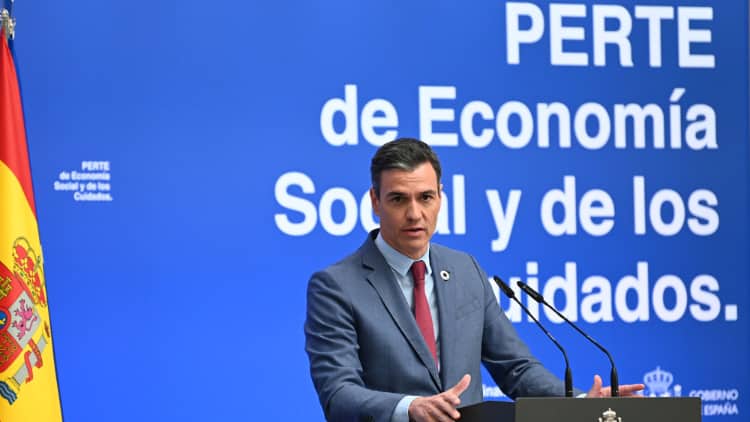Ángel Collado
The Andalusian regional elections on 19 June are looking so bad for the PSOE that Pedro Sánchez, having discounted the PP’s victory, is devoting himself to giving prominence to Vox in order to palliate the effects of a foreseeable new failure. The public promotion of the extreme right and its main candidate, Macarena Olona, to mobilise the left and halt the rise of the Popular Party has already been the focus of the pre-campaign organised by the Presidency of the Government.
In their former electoral fiefdom, the Socialists only hope that the president of the Andalusian regional government, the popular Juan Manuel Moreno, will have to make a pact with Vox after the elections. Sanchismo’s top brass is repeating the same message that failed in the regional elections in Madrid in May last year, and is content with the objective it set for the elections in Castilla y León this February: that the PP should govern with the extreme right.
Both elections resulted in severe defeats, which Sánchez tried to shrug off with the reply repeated by his spokespersons that “Madrid is not Spain” and Castilla y León is not much either. They claimed that both regions have been ruled by “right-wing” governments for decades.
For the Andalusian elections, the prospects offered by the polls for the PSOE are the same as in the two failures of the last year, but with the aggravating factor of being held in constituencies historically favourable to the party led by Sánchez. This is the most populated region in Spain (8.5 million inhabitants) and until now the PSOE’s main source of votes and MPs. One in five of the Socialists’ national MPs, in Congress and the Senate, comes from Andalusia.
The Popular Party, led by Juan Manuel Moreno, won the presidency of the regional government in the December 2018 elections, putting an end to 36 years of PSOE regional governments. The Socialists had been in power uninterruptedly since the birth of the new state of autonomies brought about by the 1978 Constitution.
Moreno’s centre-right coalition (PP plus Ciudadanos) achieved that change at the head of the Andalusian government that all the polls now consider consolidated against Sánchez’s interests, although with other conditions: the collapse of Cs and the rise of Vox. The PSOE is not getting ahead in terms of voting intentions and is second behind the Popular Party, which in its rise includes almost all of the Ciudadanos electorate.
The rise of the extreme right was the socialists’ last hope in case the PP came close to questioning their hegemony, but the polls suggest that, in any case, the left will have no margin to add more than the bloc made up of the PSOE and the different brands of the Andalusian extreme left (Podemos and its splits), all of which are falling.
Sánchez is now left with the campaign that begins next weekend to mobilise the left-wing electorate with the message of fear of Vox’s entry into a future Moreno government, a discourse that he has already set in motion. For the moment, the failed operation to leave the candidate of Santiago Abascal’s party off the lists with the accusation that Olona is running without having an address in the region has given all the limelight to the Vox deputy.
The head of the Executive reiterates the script and this time he spices it up with a rehashing of corruption cases of the PP during the period of its previous presidents. And this is what La Moncloa has decided, despite the fact that the elections are being held in the region with the biggest corruption scandals involving the socialists, such as the ERE. Two former presidents of the PSOE and the Andalusian regional government, Manuel Chaves and José Antonio Griñán, have been convicted and are awaiting prison sentences in the case.
Sánchez, who almost disappeared in the Madrid and Castilla y León election campaigns, will focus on this one to at least get his message of fear that the extreme right is coming, which is what interests him with an eye on the 2023 general elections.







